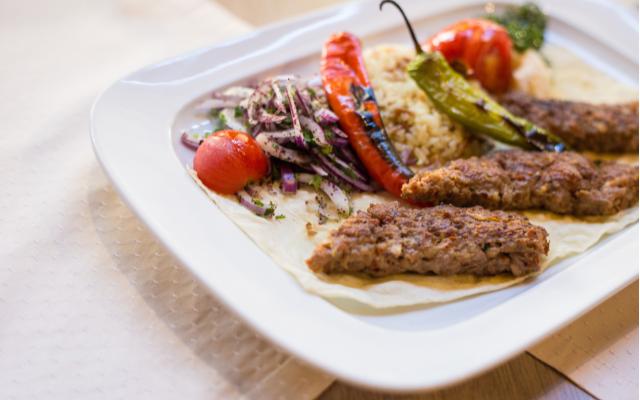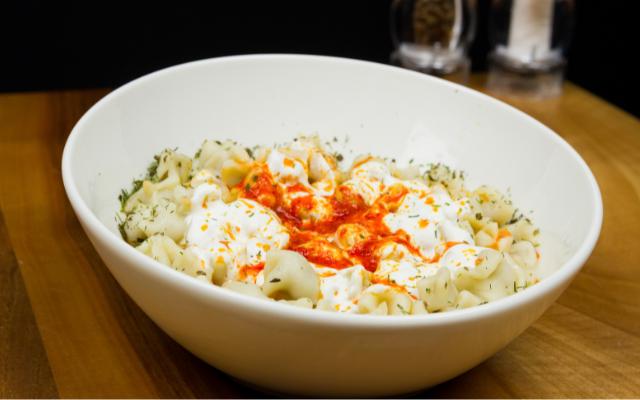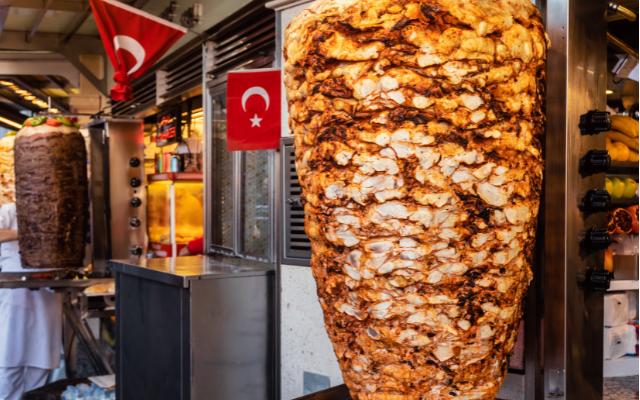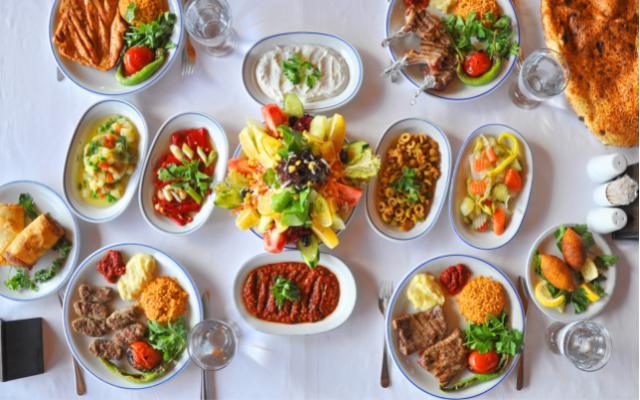Why Is Turkish Food Good For You?
Are you looking for a healthy, delicious alternative cuisine to add to your diet as part of your everyday life?
Then look no further than Turkish food, as tasted and recommended by us personally since our first ever visit to Turkey back in 1994.
With a focus on fresh ingredients and flavorful spices, Turkish Cuisine is not only delicious, but as part of what many experts refer to as the “Mediterranean Diet”, is considered one of the healthiest diets in the world.
So read on and discover more about Turkish Food and its health benefits (and potential drawbacks) with us, and uncover the answer to the often asked question: Is Turkish Food Healthy?
Overview of Turkish Cuisine
Turkish cuisine is a diverse and flavorful cuisine that has been shaped by centuries of cultural influences.
The cuisine blends Middle Eastern, Mediterranean, and Balkan flavors to create a unique and delicious fusion of tastes.
Emphasizing fresh, natural ingredients, and incorporates a wide variety of herbs and spices to create bold and distinctive flavors.
It would be very rare to find any eatery in Istanbul serving local dishes from pre-packed and pre-prepared suppliers with many menu items hand crafted by bustling kitchens.
Turkish cuisine is also known for its emphasis on healthy fats and proteins, as well as its use of whole grains, fruits, and vegetables.
With food preparation focussed on fresh ingredients, bold flavors, and healthful ingredients it’s no wonder that Turkish styled food is such a popular choice for foodies and health enthusiasts alike.

The Health Benefits of Turkish Cuisine
Turkish cuisine is certainly known globally as a healthy cuisine thanks to what we previously mentioned in terms of ingredients and preparation practices.
But let’s break down those aforementioned points and add a couple more for clarity to better understand the reasoning.
Like ANY cuisine on the planet Turkish Cuisine should be approached and utilized as part of your normal diet without over indulgence.
Obviously eating Turkish Food won’t make you healthy in itself.
However, in conjunction with correct hydration and regular exercise a Turkish based diet can certainly help you maintain health easier than many other types of cuisines available.
Use of Fresh and Natural Ingredients: Turkish cuisine is typically made with fresh, natural ingredients such as fruits, vegetables, whole grains, and lean proteins. These ingredients are packed with vitamins, minerals, and antioxidants that can help to boost your immune system to assist in keeping you healthy.
Incorporation of Healthy Fats and Proteins: Turkish cuisine includes a variety of healthy fats and proteins, such as nuts, beans, and grilled meats. These healthy fats and proteins can help to keep you feeling full and satisfied, which can help you to maintain a healthy weight.
Emphasis on Herbs and Spices for Flavor: Turkish cuisine makes use of a variety of herbs and spices, such as parsley, mint, oregano, and paprika. These herbs and spices not only add flavor to the dishes but also have many health benefits. For example, mint can help to soothe an upset stomach, while oregano has antioxidant properties that can help to protect against cell damage. Turkish cooks and chefs don’t overuse salt or any other “fake” flavors or food enhancers.
Health Benefits of Specific Turkish Dishes: Some Turkish dishes have specific health benefits. For example, Turkish breakfast typically includes a variety of cheeses, olives, and whole-grain bread, which can provide a healthy dose of calcium, healthy fats, and fiber. Turkish kebab, made with grilled meats and vegetables, is a good source of lean protein and fiber.

Nutritional Value of Turkish Cuisine
Turkish cuisine is packed with nutrients. Because most Turkish dishes are made with fresh, natural ingredients they are typically low in calories.
Some key nutrients found in Turkish cuisine include:
Protein: Turkish cuisine includes a variety of protein sources, such as beans, lentils, and grilled meats. These proteins are important for building and repairing muscle tissue.
Fiber: Many Turkish dishes include whole grains and vegetables, which are good sources of fiber. Fiber can help to keep you feeling full and satisfied, which can help you to maintain a healthy weight.
Vitamins and Minerals: Turkish cuisine is packed with vitamins and minerals, such as vitamin C, vitamin A, and iron. These nutrients are important for maintaining good health and preventing chronic diseases.
Potential Drawbacks of Turkish Cuisine?
While Turkish cuisine is generally healthy, there might be some potential drawbacks to be aware of. We hasten to add however, that these drawbacks are pretty much as you’d find in any cuisine on the planet.
High sodium content in some dishes: Some Turkish dishes can be high in sodium, which can contribute to high blood pressure and other health issues.
Use of refined sugars in some desserts: Some Turkish desserts are made with refined sugars, which can contribute to weight gain and other health issues if consumed in excess.
Impact of preparation methods on nutritional value: The nutritional value of some Turkish dishes can be impacted by the way they are prepared. For example, deep-fried dishes can be high in calories and unhealthy fats.

What Is Turkey’s Most Famous Food?
Answering this questions is relative and probably different people would have different answers, so below we’ve compiled a short list of the 8 Most Well Known Turkish Foods.
Kebab: Turkish kebab is perhaps the most well-known Turkish dish, with grilled meat, vegetables, and spices being the main ingredients.
Baklava: Baklava is a sweet pastry made of layers of phyllo dough, chopped nuts, and honey or syrup, and is popular throughout Turkey.
Pide: Turkish pide is a type of pizza that is made with a thin, crispy crust and topped with a variety of ingredients such as meat, cheese, and vegetables.
Doner Kebab: Doner is a popular street food in Turkey, featuring grilled meat that is shaved off a rotating spit and served in a wrap or pita.
Meze: Meze is a selection of small dishes that are typically served as an appetizer or as a side dish to accompany the main course.
Manti: Manti is a type of Turkish dumpling that is filled with ground meat and typically served with a yogurt sauce.
Lahmacun: Lahmacun is a thin, crispy pizza-like dish that is topped with minced meat, vegetables, and herbs.
Turkish Delight: Turkish Delight is a chewy, jelly-like candy that is often flavored with rosewater or other fruit essences, and is a popular treat throughout Turkey.
Do We Think Turkish Food is Healthy?
Well, we’re not doctors, nor are we nutritionists, but we can certainly have an opinion, and we believe Turkish food to be an absolutely delicious cuisine that could be a great addition to enhance a healthy lifestyle.
One of the best ways to start your day healthily is with a traditional Turkish breakfast.
Typically a Turkish Breakfast is consisting of cheese, olives, eggs, tomato, cucumber, yogurt, honey and bread.
Just look at those options! So many super healthy foods there and this is what has convinced us that Turkish breakfasts are the BEST breakfast on earth.
You’d have to agree that it would certainly be better to start off your day with a Turkish Breakfast featuring the above choices than say toast, or bacon and eggs, or pancakes.
For lunch or dinner, opt for a grilled kebab with a side of vegetables or a meze platter with a variety of small dishes to share. And for dessert, indulge in a small piece of baklava or a fresh fruit salad.

Turkish Food Anyone?
If you’re looking to incorporate more Turkish food and incorporate its health benefits, then there are plenty of foods popular in Turkey to choose from that can be a healthy and delicious addition to your diet.
By choosing fresh, natural ingredients and being mindful of potential drawbacks, you can enjoy the many health benefits of this rich and diverse cuisine.
What do you think? Do you like Turkish food? What’s your favorite? Let us know by sending us a message on our About Page.
Cheers and thanks for reading.
| Istanbul City FAQs | About Absolute Istanbul | Istanbul History Timeline |
| Tipping In Turkey | Belgrad Forest | Pera Museum |
Is Turkish Food Healthy For Weight Loss?
Yes absolutely. As part of the “Mediterranean Diet”, Turkish food is very healthy when consumed as part of any fitness regime.
Can Turkish Food Be Part Of A Vegan Or Vegetarian Diet?
Yes absolutely. The Turks love their vegetables almost as much as their meat and nearly half of all dishes you’ll find in Turkey will be Vegetarian with much of that food Vegan.
Is Turkish Food Safe For People With Food Allergies?
It depends on the allergy of course. But the facts are that peanuts and peanut oil are rarely used in Turkish Cuisine.
Pistachio nuts, walnuts and almonds however are regularly used.
The truth is like any cuisine anywhere, if you have allergies then you need to make sure you check before eating anything.







